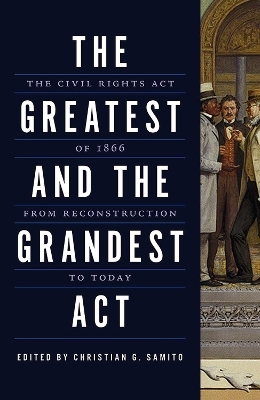
The Greatest and the Grandest Act
The Civil Rights Act of 1866 from Reconstruction to Today
Seiten
2018
Southern Illinois University Press (Verlag)
978-0-8093-3652-4 (ISBN)
Southern Illinois University Press (Verlag)
978-0-8093-3652-4 (ISBN)
Examines the Civil Rights Act of 1866, the first federal civil rights statute in American history. The act declared that all persons born in the United States were citizens without regard to race, colour, or previous condition of slavery. Essays examine the history and legal ramifications of the act and highlight competing impulses within it.
In this volume, ten expert historians and legal scholars examine the Civil Rights Act of 1866, the first federal civil rights statute in American history. The act declared that all persons born in the United States were citizens without regard to race, color, or previous condition of slavery. Designed to give the Thirteenth Amendment practical effect as former slave states enacted laws limiting the rights of African Americans, this measure for the first time defined U.S. citizenship and the rights associated with it.
Essays examine the history and legal ramifications of the act and highlight competing impulses within it, including the often-neglected Section 9, which allows the president to use the nation’s military in its enforcement; an investigation of how the Thirteenth Amendment operated to overturn the Dred Scott case; and, New England’s role in the passage of the act. The act is analyzed as it operated in several states such as Kentucky, Missouri, and South Carolina during Reconstruction. There is also a consideration of the act and its interpretation by the Supreme Court in its first decades. Other essays include a discussion of the act in terms of contract rights and in the context of the post–World War II Civil Rights Era as well as an analysis of the act’s backward-looking and forward-looking nature.
Not only is the Civil Rights Act of 1866 historically significant as the moment in Reconstruction when the federal government first sought to define national citizenship and protect civil rights, it continues to frame citizenship and rights debates and it is still used in federal lawsuits today.
In this volume, ten expert historians and legal scholars examine the Civil Rights Act of 1866, the first federal civil rights statute in American history. The act declared that all persons born in the United States were citizens without regard to race, color, or previous condition of slavery. Designed to give the Thirteenth Amendment practical effect as former slave states enacted laws limiting the rights of African Americans, this measure for the first time defined U.S. citizenship and the rights associated with it.
Essays examine the history and legal ramifications of the act and highlight competing impulses within it, including the often-neglected Section 9, which allows the president to use the nation’s military in its enforcement; an investigation of how the Thirteenth Amendment operated to overturn the Dred Scott case; and, New England’s role in the passage of the act. The act is analyzed as it operated in several states such as Kentucky, Missouri, and South Carolina during Reconstruction. There is also a consideration of the act and its interpretation by the Supreme Court in its first decades. Other essays include a discussion of the act in terms of contract rights and in the context of the post–World War II Civil Rights Era as well as an analysis of the act’s backward-looking and forward-looking nature.
Not only is the Civil Rights Act of 1866 historically significant as the moment in Reconstruction when the federal government first sought to define national citizenship and protect civil rights, it continues to frame citizenship and rights debates and it is still used in federal lawsuits today.
Christian G. Samito, who earned a law degree from Harvard Law School and a doctorate in American history, is the editor of Commanding Boston’s Irish Ninth: The Civil War Letters of Colonel Patrick R. Guiney, Ninth Massachusetts Volunteer Infantry and Fear Was Not in Him”: The Civil War Letters of Major General Francis C. Barlow, U.S.A, and the author of Becoming American under Fire: Irish Americans, African Americans, and the Politics of Citizenship during the Civil War Era.
| Erscheinungsdatum | 10.07.2018 |
|---|---|
| Co-Autor | Michael Vorenberg, Rebecca Zietlow, Michael Les Benedict, Millington Bergeson-Lockwood |
| Verlagsort | Carbondale |
| Sprache | englisch |
| Maße | 152 x 229 mm |
| Gewicht | 420 g |
| Themenwelt | Geschichte ► Allgemeine Geschichte ► Neuzeit (bis 1918) |
| Geisteswissenschaften ► Geschichte ► Regional- / Ländergeschichte | |
| Geschichte ► Teilgebiete der Geschichte ► Militärgeschichte | |
| Recht / Steuern ► EU / Internationales Recht | |
| Recht / Steuern ► Öffentliches Recht ► Verfassungsrecht | |
| Recht / Steuern ► Rechtsgeschichte | |
| Sozialwissenschaften ► Politik / Verwaltung | |
| ISBN-10 | 0-8093-3652-9 / 0809336529 |
| ISBN-13 | 978-0-8093-3652-4 / 9780809336524 |
| Zustand | Neuware |
| Haben Sie eine Frage zum Produkt? |
Mehr entdecken
aus dem Bereich
aus dem Bereich
Europa 1848/49 und der Kampf für eine neue Welt
Buch | Hardcover (2023)
DVA (Verlag)
48,00 €
Giordano Bruno - ein ketzerisches Leben
Buch | Hardcover (2024)
C.H.Beck (Verlag)
29,90 €


